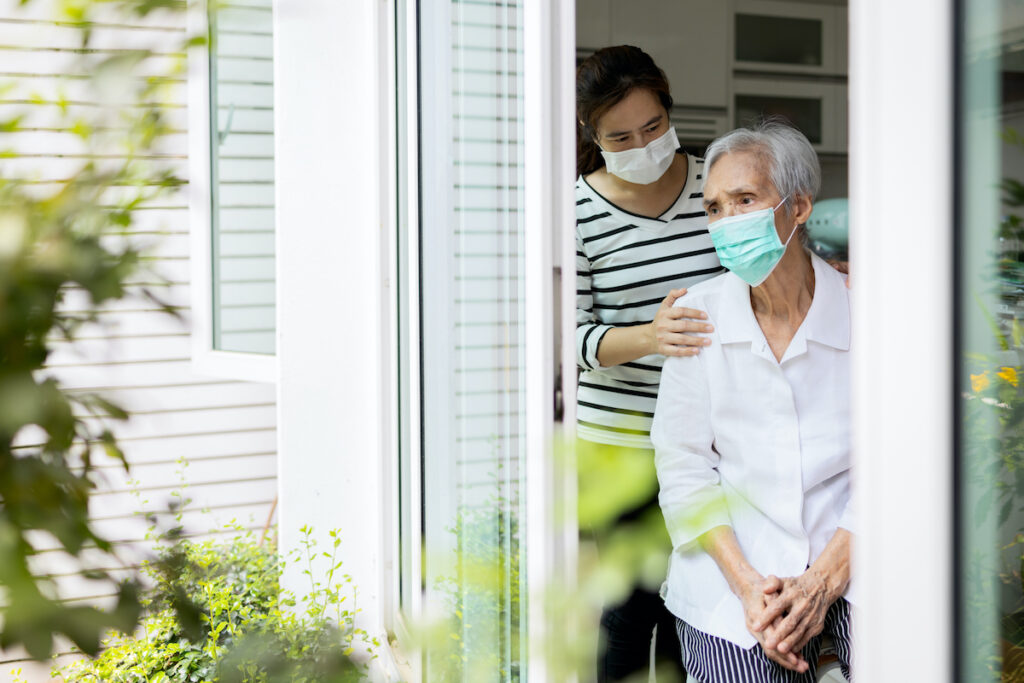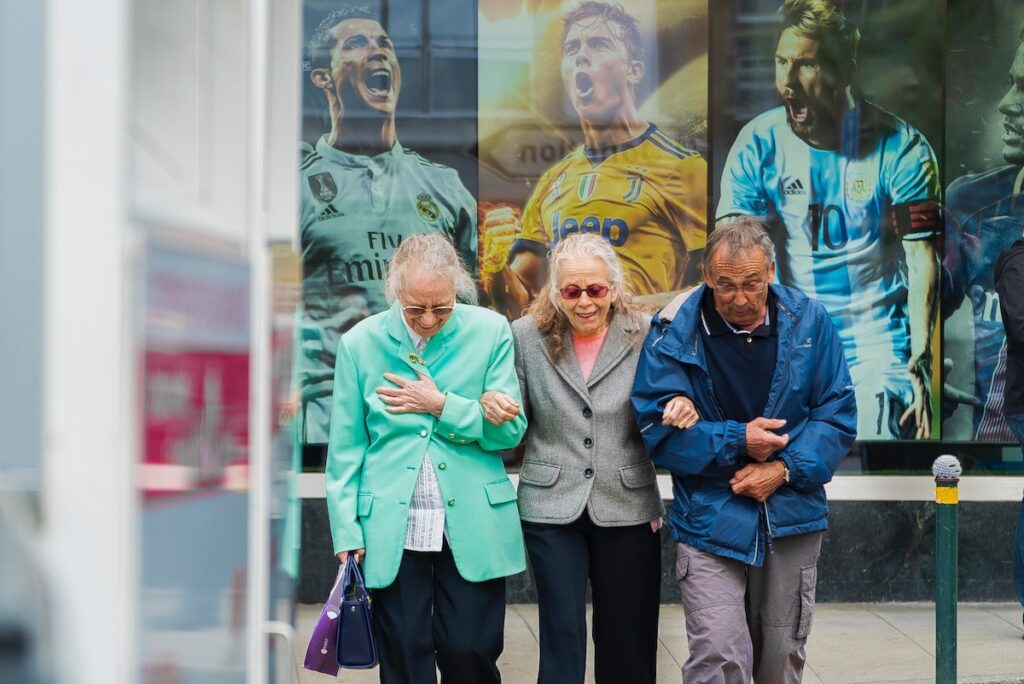
COVID-19 has been affecting all of us in one way or another. We might have had it, someone we know has had it or even passed away from it. Our mental health may have suffered from living in lockdown, or our daily working routine has completely changed. Undoubtedly, older adults, including those living with dementia, are at particular risk of suffering more severe symptoms from the virus.
Even when not directly catching the virus, COVID-19 has significantly affected the lives of older adults and people with dementia of any age (Giebel et al., 2020a; 2020b). Public health measures can have a severe impact on their lives. Being unable to access previous forms of social support services, and instead being restricted to your own four walls, without much mental, physical, or social stimulation, has been linked to faster deterioration in dementia (Giebel et al., 2020a).
Because older adults are more susceptible to severe virus symptoms (Jordan et al., 2020), they need to be supported and ‘shielded’, as much as possible. This may be easier for people who have the ability to stay in their own homes, and maybe their daughter or a friendly neighbour delivers food regularly. But what about those who have to be in a clinical setting, such as a hospital or in a mental health ward?
This is what Professor Gill Livingston from UCL and a team of researchers was interested in. In this blog, I will look at her recent paper in The Lancet Psychiatry, which explores prevalence, management, and outcomes of COVID-19 infections in older adults and people with dementia of any age in mental health wards in London (Livingston et al., 2020).

COVID-19 has had a detrimental impact on the lives of older people and those with dementia.
Methods
The authors conducted a retrospective observational study in five London-based National Health Service Trusts. This involved collecting demographic data, mental health diagnoses information, and various forms of COVID-19 data (clinical diagnosis, symptoms, management, outcome) in older adults and people with dementia of any age. The study looked at the period from 1st of March to 30th of April 2020.
The authors then performed a number of regression analyses, investigating whether for example having a dementia diagnosis was associated with COVID-19 outcome (died vs. survived). The authors also explored variations between young-onset dementia (aged below 65), late-onset dementia (aged 65 or above), or no dementia.
Results
Across the five mental health NHS Trusts, 344 participants (older adults and people with dementia of any age) were included in the analysis. Of these, 38% (n=131) were diagnosed with COVID-19 during March/April. Amongst the 131 patients with COVID-19, 12% were asymptomatic, and did not experience any symptoms. And 15% of all cases with COVID-19 died from the virus within the study period.
Importantly, no patients had known COVID-19 symptoms or a diagnosis upon admission, yet 38% were diagnosed within the study period.
Where patients were suspected of having a diagnosis of COVID-19, only 79% were isolated for a median of 12 days. The rest (21%) were kept on the wards with other confirmed COVID-19 patients.
Regression analyses showed that being older and having any type of dementia were associated with increased risk of dying from COVID-19 infections.

Being older and having dementia is associated with increased COVID-19 mortality in mental health wards.
Conclusions
These are some of the first findings showing the increased COVID-19 mortality in people living with dementia, as well as with increased age. Previous findings from the Office for National Statistics (ONS) (2020), for example, have shown that dementia is the most common pre-existing condition in care home residents who died from COVID-19. However, before this study by Livingston and colleagues (2020), there appears to have been no evidence on COVID-19 mortality in people with dementia living either in the community or in clinical settings.
This study shows us how important it is to better protect people living with dementia (but also older adults) from the virus, be that in clinical, community or residential settings. However, recent news also suggests that there is also a trade-off between protection and ‘shielding’ from the virus, and mental health and quality of life. If we remove vital social contact between older adults and people with dementia and their family and friends, this can lead to increased social isolation, as well as faster deterioration of dementia symptoms (Giebel et al., 2020a). That’s why we need to strike a careful balance between protecting and engaging people with dementia and older adults.
There are different challenges though for people with dementia and older adults in mental health wards and clinical settings. Here, it is more about ensuring reliable access to full Personal Protective Equipment (PPE) and speedy and regular testing, preferably daily. Nevertheless, worldwide shortages of PPE in health care staff has been a huge issue at the beginning of the pandemic (Tabah et al., 2020), and still is in some sectors. Without sufficient PPE, staff are putting themselves at risk though, and possibly bring in the virus themselves and thus put patients at risk. This is a possibility as no patient had a COVID-19 diagnosis at admission, so might staff have brought in the virus, which then could have easily spread across the wards.

People with dementia and older adults need to be protected better from the virus.
Strengths and limitations
This is a really interesting study which looked back at COVID-19 infections and mortality in older adults and people with dementia in mental health wards across London. One of the strengths is that it also included people with youth onset dementia, who are often discounted in dementia research due to their age. The authors also collected retrospective observational data from across five mental health NHS Trusts, so findings are a bit more representative. However, as that representation goes, we have to be mindful that findings are based on people living in London. They do not provide us any insight into COVID-19 in people with dementia and older adults in the rest of the country, or in more rural regions for example. This could be a next step, looking at data on a more national scale, but also international scale, and also taking into account the size of the mental health wards and number of different staff (which might be related to how likely it is that staff bring in the virus).

Findings are London-based, so future research needs to explore COVID-19 mortality on a national level.
Implications for practice
Data are based on March and April 2020, so just before lockdown commenced and at the very height of the nationwide three-month lockdown. Whilst there are still many things which have not changed for the better in terms of managing the pandemic in the care sector for older adults and people with dementia, testing for example seems to be done swifter now than it was at the very beginning. Equally, PPE might be more available now than it was back then. Still, there are lots of issues to properly protect and shield older adults and people with dementia.
What this study shows is the high potential for COVID-19 to have spread across mental health inpatients, and how people with dementia and older adults are at particularly high risk of dying from the virus. There is a clear need for better, daily testing in mental health settings for both patients and staff, as well as easy access to full PPE for staff. It would be interesting if the authors could compare first lockdown findings with data from the second wave we are currently in.
This study was about mental health inpatients, but let’s not forget people with dementia and older adults living in the community and of course in care homes. Findings from this study might have important implications and relevance to the care home sector in fact, considering the close clustering of residents (similar to mental health inpatients) and staff delivering care (similar to health professionals).

We need more regular and faster testing to ensure the spread of the virus can be contained in both inpatients, but also in the care home sector.
Statement of interests
None.
Links
Primary paper
Livingston, G., Rostamipour, H., Gallagher, P., Kalafatis, C., Shastri, A., & Huzzey, L. et al. (2020). Prevalence, management, and outcomes of SARS-CoV-2 infections in older people and those with dementia in mental health wards in London, UK: a retrospective observational study. The Lancet Psychiatry. doi: 10.1016/s2215-0366(20)30434-x
Other references
Giebel C, Cannon J, Hanna K, et al. Impact of COVID-19 related social support service closures on people with dementia and unpaid carers: a qualitative study. Aging & Mental Health 2020a; doi: 10.1080/13607863.2020.1822292
Giebel C, Lord K, Cooper C, et al. A UK survey of COVID-19 related social support closures and their effects on older people, people with dementia, and carers. International Journal of Geriatric Psychiatry 2020b; doi: 10.1002/gps.5434
Jordan RE, Adab P, Cheng KK. COVID-19: risk factors for severe disease and death. BMJ 2020;368; doi: 10.1136/bmj.m1198
Office for National Statistics (ONS). Deaths involving COVID-19 in the care sector, England and Wales: deaths occurring up to 12 June 2020 and registered up to 20 June 2020 (provisional). London, England 2020: ONS.
Tabah A, Ramanan M, Laupland KB, et al. Personal protective equipment and intensive care unit healthcare worker safety in the COVID-19 era (PPE-SAFE): An international survey. Journal of Critical Care 2020; 59:70-75.
Photo credits
- Photo by Mohammad Fahim on Unsplash
- Photo by Philippe Leone on Unsplash
- Photo by Christian Battaglia on Unsplash
